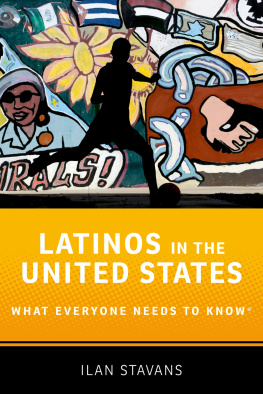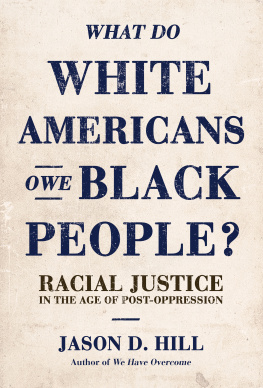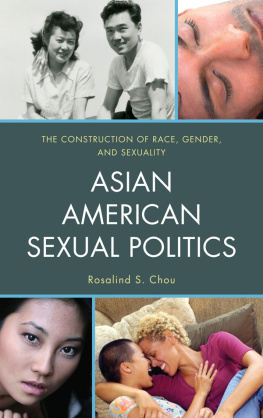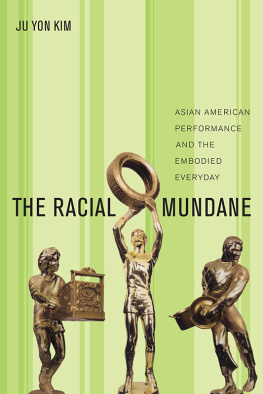Thank you for buying this ebook, published by NYU Press.
Sign up for our e-newsletters to receive information about forthcoming books, special discounts, and more!
Sign Up!
About NYU Press
A publisher of original scholarship since its founding in 1916, New York University Press Produces more than 100 new books each year, with a backlist of 3,000 titles in print. Working across the humanities and social sciences, NYU Press has award-winning lists in sociology, law, cultural and American studies, religion, American history, anthropology, politics, criminology, media and communication, literary studies, and psychology.
The Racial Middle
NEW YORK UNIVERSITY PRESS
New York and London
www.nyupress.org
2008 by New York University
All rights reserved
Library of Congress Cataloging-in-Publication Data
OBrien, Eileen, 1972
The racial middle : Latinos and Asian Americans living beyond the
racial divide / Eileen OBrien.
p. cm.
Includes bibliographical references and index.
ISBN-13: 978-0-8147-6214-1 (cl : alk. paper)
ISBN-10: 0-8147-6214-X (cl : alk. paper)
ISBN-13: 978-0-8147-6215-8 (pb : alk. paper)
ISBN-10: 0-8147-6215-8 (pb : alk. paper)
1. Hispanic AmericansEthnic identity. 2. Hispanic America
Attitudes. 3. Asian AmericansEthnic identity. 4. Asian Americans
Attitudes. 5. RacismUnited StatesPublic opinion. 6. Public
opinionUnited States. 7. United StatesRace relations. I. Title.
E184.S75O275 2008
305.800973dc22 2007051507
New York University Press books are printed on acid-free paper,
and their binding materials are chosen for strength and durability.
Manufactured in the United States of America
c 10 9 8 7 6 5 4 3 2 1
p 10 9 8 7 6 5 4 3 2 1
Acknowledgments
Like no other sole-authored project Ive worked on before, this book is a collaborative effort that I never could have accomplished on my own. The support and assistance I have received along the way has been so overwhelming, that I apologize in advance if I have missed anyone. Truly the circle of sustenance around me during this project has been boundless and immeasurable. But a few deserve special mention.
First and foremost, I am grateful to the fifty men and women who so generously gave their time to speak with my student interviewers or me. Most refused what little compensation we offered, and the rest accepted little more than the cost of lunch or a drink. It is my hope that this gift of your time will contribute tremendously to our collective knowledge about the racial middle and help pave the way for you to soon inhabit a more open society than currently exists.
The fact that I even arrived at a total of fifty respondents is due in large part to the able assistance of three undergraduate student interviewers who worked hard for this projectJennifer Conlon, Annie Hirschman, and Leah Adams. Additionally, two other students assisted with transcribing and codingEmily Gates and Catherine Estevez. I am especially grateful to Catherine for her constant and candid feedback in the later stages of the project. Her keen observations on patterns in the data led to her collaboration with me on the writing of , and I am so proud of her work. Data collection was also enhanced by the generosity of Michael Armato and Sheera OlaskyMikes willingness to circulate my announcement for summer housing in New York, together with Sheeras willingness to donate her Harlem apartment for next to nothing, by Manhattan standards, were both indispensable in securing the first phase of the interviewing for this project.
The financial support that allowed me, as well as a majority of the abovementioned students, to spend summers collecting data was provided by the Arts and Sciences Deans Office at the University of Richmond. Special thanks to Andy Newcomb and Kathy Hoke, who both played roles in securing that support. Sociology department chair Joan Neff was patient with scheduling, travel reimbursement, and approving student independent studies, among other things, which helped things flow more smoothly. Kerran Kempton, the administrative assistant, was equally patient in helping to order tapes, recorders, transcribers, and to serve as a go-between to get such materials between the students and me when I was away from the office. Now that I have moved on to Christopher Newport University (and special thanks to Joe Healey for the needed push that helped me make that leap), I can fully appreciate the meaning of departmental support.
Outside my own academic environment, support has also been boundless. Extra special mention in this category goes first and foremost to Deirdre Royster. Aside from those for whom reading this manuscript was part of their job description, Dee is the one who pored over the manuscript most thoroughly (although any errors that remain are most undoubtedly my own). There are a couple of chapters that she completely overhauled, coming up with new section titles and so forth. I am a great admirer of her work; I was honored that she took the time to give such detailed feedback on my writing, but our relationship went even further than that. Our meetings became not only a source of writing support, but seemingly naturally and effortlessly flowed into pedagogical support, the emotional stumbling blocks of being on sabbatical, parenting, relationships, bodily functions, and everything in between. Although I feel as if she were coauthor on this book, I look forward to us being real coauthors on a future project. We work well together! Thanks also to Deenesh Sohoni who helped direct me to various references on Asian Americans and intermarriage, one of his specialties.
Being also an admirer of the work of Eduardo Bonilla-Silva, Joe Feagin, and George Yancey, I very much appreciated their informal feedback on earlier stages of the project. As I was entering the book publishing market again after years away, I turned to their advice, as well as other admired colleaguesKathleen Korgen, David Brunsma, Pamela Perry, Melanie and Rod Bush, and others who I am sure I am forgettingfor whose help I am grateful. I also especially thank Leanne Andersen and Kate Wahl, who showed a steady and unwavering support in this projectI am sure our paths will cross again in the future.
At NYU Press, where I found my home, I am grateful to the other Eileen, executive editor Ilene Kalish, whose support at every stage has been phenomenal. Also thanks to everyone else at NYU Press, including Gabrielle Begue and Despina Papazoglou Gimbel, whose attention to the details was much appreciated. I am certainly indebted to the comments of two thorough and insightful anonymous reviewers who worked on behalf of the press.
While those mentioned above formed much of the intellectual support for the work, there are many other sources of social and emotional capital in my life, without whom this book quite surely would never have been completed. Although I completed three books before this one, I underestimated how much being a parent would affect the work pace to which I had formerly been accustomed. To that end, I am especially indebted to my step-grandmother-in-law, better known as my daughters great-grandmother, Essie James. For close to nothing each week, she took good care of Kaya and was gracious in attempting to understand why, even though Im not going to Richmond, I still have to work. This is also a difficult truth for ones live-in family to swallow, so I am also grateful to both my daughter, Kaya, and my partner Kendall, for tolerating all the times I was hopelessly glued to my computer screen. Many a paragraph was written through Kayas steady pleading of click on the X, Mommy! between being babysat by the PBS or Nick Jr. morning lineup. And I know that Kendalls over-sixty-five-hour-a-week work schedule leaves little time for much else, so I appreciate his willingness to occupy Kaya while I transcribed or went to a coffeehouse to write, even though he would have much preferred us all spending the time together, or going off and doing his own thing. His steady encouragements in the most stressful momentsyoull get it done, honey, you always doare always appreciated. Other at-a-moments-notice free child care has been provided by Aunt TuTu (my sister-in-law, Kathy Roache), her daughter, Jameshia Roache, and Gramma (my mom, Jean Kelly)who once took care of Kaya overnight in Boston so I could continue on to Montreal to meet with book publishers. I am so fortunate to have family aroundthere is no such thing as an isolated superwoman, to be sure.






